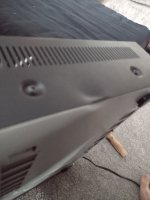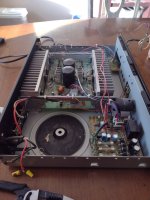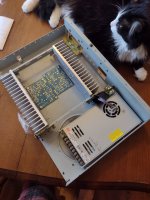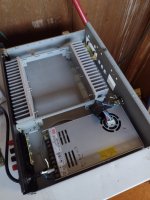After weeks of research Ive decided to build a stereo amp based off of the modulus 86, but it had to be cheap. Really cheap. I decided to disassemble and recycle an older amp to help cut down on the number of purchased parts. I picked up a sonamp 260 on ebay that was in bad shape. It had been dropped and had a lot of damage to the boards. Perfect candidate. Unfortunately, the transformer put out far more voltage than i could use, so I decided to go ahead and try a meanwell I picked up for $15
Attachments
Last edited:
First things first, i had to get rid of the dent and refinish the paint. I was able to make it look good as new with my hammer and vice in no time. Stripped out all the old parts and separated the ones which would be reused, and then mocked up power supply location. I am going to keep the gain chip in case i decide to tap into r14 on the modulus boards and implement an adjustable gain. I am also keeping a section of the rca input board so that i can keep the ability to plug in my subwoofer. Modulus 86 boards showed up just as i got power supply mounted!
Attachments
As you can see in the above post, the modulus chips would end up too close to each other to utilize the screw connectors on inputs and outputs. I want to keep that feature so that the amp will be completely modular and easy to service in the future. Therefore i decided to move the front heatsink forward by about 5/8 of an inch. I also got the fuse and power cord hooked up to the power supply. Thats it for today. More parts are in the mail
Attachments
Loving that thrift.
I'm always on the lookout for cheap amps to salvage cases, heatsinks and transformers.
One can get a good stash after a while.
Onkyo home theater amps are especially useful as they have big transformers with 42-21-0-21-42 taps. As well as proper heat sinks instead of the stamped fin type heatsinks found in most receivers.
The onkyo stuff seems to have a high failure rate so it's readily available in faulty form.
I'm always on the lookout for cheap amps to salvage cases, heatsinks and transformers.
One can get a good stash after a while.
Onkyo home theater amps are especially useful as they have big transformers with 42-21-0-21-42 taps. As well as proper heat sinks instead of the stamped fin type heatsinks found in most receivers.
The onkyo stuff seems to have a high failure rate so it's readily available in faulty form.
Sounds like you and I are on the same page sadface. Im cheap about all of my hobbies.
Heres my morning update. Pcb population in progress. I expect to have that as complete as i can today, and then its just waiting on a bunch more parts.
Heres my morning update. Pcb population in progress. I expect to have that as complete as i can today, and then its just waiting on a bunch more parts.
You'll need two of the Mean Well supplies, though. Each produces +24 V. You need two in series for ±24 V. The RPS-200 series could be the ticket.
Neat project, though.
Tom
Neat project, though.
Tom
The power supply puts out 29.8 volts turned all the way up, and neurochromes documentation calls for 30v dc, so i would think its ok unless im missing something? If I am and i have to purchase another power supply thats fine, i just thought id try to be cheap and use what Ive got.
I just realized my pictures didnt upload last time. Oh well. Ive got the pcbs mostly populated and i also did some power wire routing in the chassis. Chip and brackets i need to continue should be in monday, and I think the first test run should happen by tuesday
Can one of you explain to me why? I dont mean to sound ignorant, but I am. The way i understand is that dc volts is dc volts. What is the +-30vdc and how would i wire it up with 2 power supplies? Its too late to use the higher voltage linear supply that came with my parts amp, because I already ground off the stand it mounts to in order to fit the smps.
Your supply only give 0 to 30Vdc. You need -30vdc to 0 and 0 to +30vdc.
You need another Meanwell exactly like the one you have.

You need another Meanwell exactly like the one you have.
Thanks guys for pointing this out. I did some more reading and that seems to check out. It wouldnt have occurred to me, but it makes sense given that an amp has to put out ac voltage. I wish i had thought of this before i drilled holes and cut stuff. If i have to spend more money on a power supply anyway, i may pull out the welder and fix things so i can use a torroidal supply. I originally wouldve rather done that anyway. Also, im not sure I could even run a pair of the meanwells, even with just one it dims the lights in my house pretty significantly when I turn it on. Two may just trip a breaker
After looking at all the options, I decided to just pick up another lrs350-24 and give it a go in series. If it works it will be the cheapest thing to do. It looks like dual rail smps are rare, and they all ship from china which would possibly add months to the build time. The stock power supply put out closer to 40v, and had at least one broken trace and a bunch of dead caps
No. The Modulus documentation calls for ±30 V. Plus/minus 30 V. +30 V, 0, -30 V. Exactly as John65B shows above.The power supply puts out 29.8 volts turned all the way up, and neurochromes documentation calls for 30v dc, so i would think its ok unless im missing something? If I am and i have to purchase another power supply thats fine, i just thought id try to be cheap and use what Ive got.
Tom
That could be a nice option. A KBPC2510 rectifier bridge and a pair of chassis-mounted caps make for a quick power supply as long as you have the transformer.If you look at the previous toroidal power supply caps and see that they are 35v, you may be able to reuse that power supply. It may be dual rail ...
Tom
I just got an email back from you about changing the gain Tom, you seem to be everywhere at once. What do you think about running two supplies in series? Ive already got one on the way, but if it wont work satisfactorily then ill just save them for a different project
I think running two Mean Well supplies in series is a great idea. In fact, that's what I recommended in Post #6 and #17. It's also what john65b shows in Post #13.
Tom
Tom
- Home
- Amplifiers
- Chip Amps
- Modulus 86 CHEAP build



